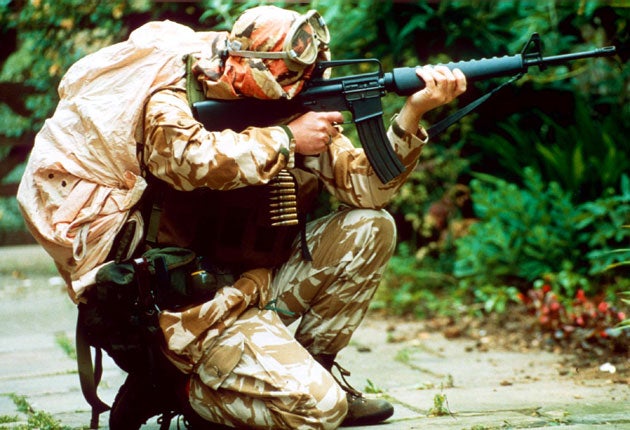Special forces to get boost to fight insurgents
UK 'plays to its strengths' as economic downturn threatens regular troops

Britain's special forces are to be boosted to prepare the country for long wars of insurgency under plans being drawn up in a "major rebalancing" of the military for operations abroad.
The Defence Secretary, John Hutton, will today outline the new strategy which is being drawn up with the Americans to prepare for years of commitment in Afghanistan and the expectation of other similar conflicts.
According to senior defence sources, the severe overstretch in the UK armed forces, along with the economic downturn, means that this country will find it difficult to send substantial numbers of conventional forces in support of the Americans in future conflicts.
This has been highlighted by Gordon Brown's reluctance – despite the British drawdown from Iraq – to agree to the request of UK commanders' to send 2,000 extra troops to join American reinforcements in Helmand. Instead, the Prime Minister is expected to announce that around 750 additional forces will be temporarily deployed for the Afghan elections scheduled for August. In addition, around 300 specialists dealing with bomb disposal will be sent to deal with the rise in roadside explosions and mines.
SAS units are already being moved from Iraq to join the SBS in Afghanistan as part of a US led surge. This followed a specific request from the Americans who have been working closely with UK special forces in the two conflicts. The thinking behind the review, say officials, is that Britain must "play to its strengths" at a time of scarce resources.
But some senior officers fear that the announcement of concentration on special forces is paving the way for cuts in conventional defence expenditure with the two proposed new aircraft carriers and fast jets under threat.
They also hold that the secret nature of much of the work being done by the SAS and SBS mean that British contributions to such operations may not be fully recognised internationally.
The shadow Defence Secretary, Dr Liam Fox, said yesterday: "There's no doubt that Britain's Special Forces are among the world's elite. But any structural alterations to the Armed Forces need to be placed within the context of a full Strategic Defence Review. There is a suspicion that these changes are being driven by the Government's economic incompetence rather than Britain's security needs."
However, Mr Hutton, in a speech today, will say that "deep and wide-ranging changes to our armed forces" are to be implemented after an analysis of the Afghan war initiated by him and US Defence Secretary Robert Gates last month.
Mr Hutton will say: "UK special forces are among the best in the world. Capable, effective, respected and contributing massively to the defeat of al-Qa'ida in Iraq and Afghanistan."
Speaking of threats posed by insurgents, Mr Hutton will say: "The female suicide bomber; the boy tricked into killing himself and British soldiers by pushing a wheelbarrow of explosives, such threats strike a challenge to the core of how we operate. When British troops are deployed to fight that threat, there is only one outcome we can countenance – winning".
Pointing to a military review the US is carrying out, Mr Hutton will say in his address to the Institute for Public Policy Research: "We need to see a similar readjustment here in the UK in the years ahead – a rebalancing of investment in equipment and people to meet the challenge of irregular warfare.
Join our commenting forum
Join thought-provoking conversations, follow other Independent readers and see their replies
Comments
Bookmark popover
Removed from bookmarks